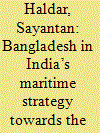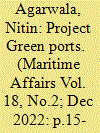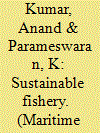|
|
|
Sort Order |
|
|
|
Items / Page
|
|
|
|
|
|
|
| Srl | Item |
| 1 |
ID:
190733


|
|
|
|
|
| Summary/Abstract |
This article looks at the potential of Bangladesh in India’s maritime strategy in the Bay of Bengal, in light of the shifting focus on the emergent Indo-Pacific. It argues that India’s maritime strategy in the Bay of Bengal is a driver of its wider engagement in the emerging Indo-Pacific. Therefore, engaging Bangladesh in the Bay of Bengal is strategically imperative for India. However, this requires New Delhi to deepen and expand its strategic convergences with Bangladesh and ensure that Dhaka warms up to the idea of an emergent Indo-Pacific that might even prompt geopolitical and geo-strategic competition with China.
|
|
|
|
|
|
|
|
|
|
|
|
|
|
|
|
| 2 |
ID:
190736


|
|
|
|
|
| Summary/Abstract |
China has been consistently staking claim to the entire South China Sea (SCS) citing historical linkages. The consistent nature of these claims point towards the long-term nature of China’s interests, from nationalism and reclaiming lost territories to commercial and geostrategic interests. The onset of COVID-19 in Wuhan in November 2019 and its transformation into a global pandemic witnessed a shift in China’s foreign policy. The article analyses China’s evolving geopolitical interests and recent geopolitical opportunism during COVID-19, by way of unilateral state-level administrative actions, completion of military infrastructure development, conduct of military exercises, aggressive military actions, and wolf warrior diplomacy, to gain operational advantage by changing the status quo in its favour in the SCS in order to subordinate other claimants and dominate the region.
|
|
|
|
|
|
|
|
|
|
|
|
|
|
|
|
| 3 |
ID:
190734


|
|
|
|
|
| Summary/Abstract |
Seaports have evolved with changing technologies to ensure the handling of close to 80 per cent of global trade by volume and 70 per cent by value. As the ports have grown across the world, unabated pollution from numerous activities of ships, ports, industries, and infrastructure development has forced countries to focus on safe, efficient, and sustainable ports by focusing on community development to achieve cleaner harbours, skies, and soil. An effort of the Government of India for major Indian ports in this direction is Project Green Ports. Though the project was initiated in 2016, there is little update available about the project. It is to fill this gap that the article discusses the progress of the major Indian ports towards becoming green ports. In doing so, the article analyses the efforts made and the existing shortcomings to answer whether the Indian ports are on the right track to becoming green ports.
|
|
|
|
|
|
|
|
|
|
|
|
|
|
|
|
| 4 |
ID:
190735


|
|
|
|
|
| Summary/Abstract |
The world ocean is a continuum that facilitates relatively free interchange among its parts and is of fundamental importance to studying environmental justice. Environmental justice sits within the larger ambit of social justice and equity. The article examines the effects of illegal, unreported, and unregulated (IUU) fishing within the Indian Ocean Region (IOR) on sustainability, and damage to the marine ecology, resulting in environmental and distributive injustice to the coastal communities. It also highlights the prevalence of IUU fishing on the high seas and in the exclusive economic zones (EEZ) of the coastal States vis-à-vis existing international fisheries laws. In addition, the article analyses the feasibility of managing the marine environment in the IOR through people’s participation, utilising the tenets of Commander’s Estimate of the Situation (CES), and suggests courses of action (CoAs) to achieve environmental justice. Further, it makes use of three case studies to assess the feasibility of people's participation in achieving sustainable fishing practices.
|
|
|
|
|
|
|
|
|
|
|
|
|
|
|
|
|
|
|
|
|